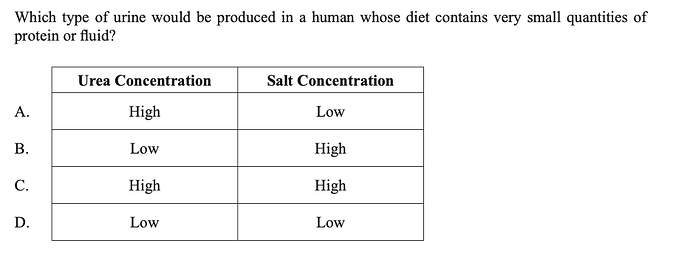answer is B
if a person’s fluid intake is low, then wouldn’t ADH be secreted and urea concentration be high?
hi i agree, what past paper is this? maybe it’s the answer key?

it’s this one question 20
Not sure how much sense it makes, but is it possible that the Urea is low as theres less protein in the diet? So less is being made in the first place?
Salt concentration = overall urine concentration. More ADH means more concentrated urine.
Urea is a less toxic product of Ammonia which we get by metabolizing the amine groups of different amino aids, so we will have less urea in the urine.
so in this case we dont check the information given in the question? it is more extra information to confuse right
Not really, we lose minerals usually in a fairly constant rate and mainly control fluids, if we don’t drink enough we lose the balance between them.
If we don’t drink enough, ADH will work really hard to make sure what we do drink stays in the system, but we will still have salts in the urine, which now be more concentrated because concentration is n/L, and L is low because there’s little fluids there.
So based on the stem of the question, the fact that this individual has less protein in their diet means less urea formation (if less amino acid amine groups are metabolised)?
Yes, exactly
Urea is made due to amino acid metabolism, this is where we get the N groups from.
then by knowing the protein amount we can conclude about the urea concentration. what about the salt amount? how do we conclude if it’s high or low according to this question
With less fluids in the diet the concentration of salts will be higher as a result
